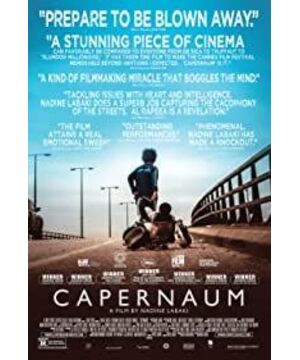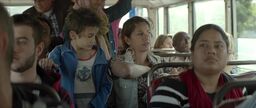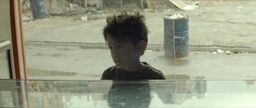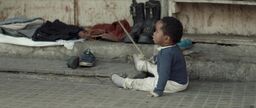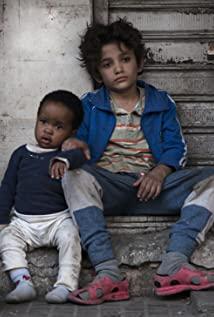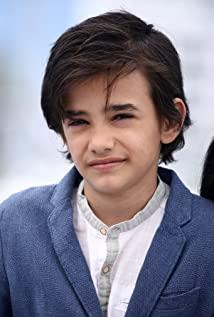I keep telling you, "Your son was dead before he was born." He doesn't exist. Even ketchup has a name, a production date and an expiration date.
When a region cannot maintain order even with religion, it truly enters the most primitive form of chaos. Lebanese female director Nadine Nabaki's third feature feature film "Capernaum" continues to discuss the serious social justice issues in Lebanon.
Capernaum is the birthplace of Jesus in the Bible, where many miracles were born, but it is also a place cursed by Jesus, and this word also refers to chaos and disaster in Arabic.
The 126-minute "Capernaum" covers too many social topics, and any single one can extend countless discussions. The sale of children, underage marriage, child labor, drug dealing, unregistered residents, illegal Syrian immigration, illegal residence, etc., these poverty-stricken societies are intensively interspersed in the movies.
This time, Nadine focused her lens on children's issues.
The problem of children is a very prominent social problem in Lebanon. You can see and feel this kind of suffering in the streets and alleys of this country. As shown in the movie, the streets and alleys of this country are crowded with all kinds of unattended, livelihood, most likely unregistered children, fruit juice sellers, chewing gum sellers, and daily necessities sellers. , Walking around in traffic, knocking on car windows to sell flowers, carrying gas bottles that are much larger than their own in size and weight...
How poor Zaen is, seven siblings (and a brother in prison) were forced to sleep on the floor of a bedroom. On the other side of the cloth hanging up as a separation, they were parents who were having sex. In the face of poverty, everyone's life is like the Marilyn Monroe whose breasts were exposed by Zain's shirt, without dignity at all.
The more naked you are, the poorer you live.
The world depicted in "Capernaum" is so poor and chaotic that some film critics questioned it as a deliberate gimmick by the director. Nadine also went back directly and said that these people should move their fat ass sitting firmly in the coffee shop (code), leave their little corner, and go out for more walks.
The criticism that "Capernaum" is deliberately sensational can only say that money and a comfortable life limit the imagination of these people.
The drug trafficking shown at the beginning of the movie is an ordinary section of daily life in this community, using children to go to the pharmacy to defraud prescription drugs (such as the tranquilizer tramadol), crush them in water, soak them in clothes and dry them, and bring them to prison. Re-extract with water to make drinkable analgesic drinks for sale.
There are many more violent behaviors and phenomena, such as rape, pedophilia, etc. Directors have not been included in the film, because the film shows that these are enough to be heartbreaking.
Those film critics who sit in the air-conditioned room criticizing the director for grandstanding can never imagine the kind of despair that can't escape with all their strength.
Breaking through the class and escaping from the original family is not a fate that can be achieved with two words of hard work.
Sometimes, the harder you work, the more desperate you will become.
Zain has done all the efforts you can imagine for a person to break through the shackles of class, at least what he can do at his age, has done his best.
At the beginning of the movie, Zain is running between the birthplace that he cannot choose, going to the pharmacy to cheat prescription drugs, change the gas, move water, deliver goods, deliver vegetables, set up a street stall to sell fruit and juice, all things that can make money to help the family. , 12-year-old Zain did it without complaint.
When everyone is busy surviving, Zain is silently resisting this vicious circle, throwing away the licorice and ramen that Assad had shown Saha, asking his parents to go to school, and concealing the facts of Sakha menstruation. .
Running between all kinds of manual labor, the school bus that picks up students has become an insurmountable gap between Zahn and his ideal life.
You might say, why didn't he leave this original family and live on his own.
Zain really did the same. After his 11-year-old sister Saha was forced to marry the landlord’s adult son Assad, he took a long-distance bus and left this chaotic place, but he just jumped from a despair to The other one is just desperate.
He followed an old man in a "cockroach suit" and got out of the car in front of a dilapidated and shabby playground. He only had 250 Lebanese pounds of LBP (1 yuan RMB) left in his hand. He was trying to find a job, but there was nothing. People are willing to ask a 12-year-old thin boy to finally live with Targus, who lives illegally in Ethiopia. The sudden disappearance of Targus left Yunus, who was less than a year old, and Zain faced a new round of difficulties.
Survival and choice in the desperate predicament are the contradictory forces that the director strives to express in Zain.
On the one hand, he has the most primitive and strong desire for survival. This kind of nature allows him to continue to survive in any way, whether in the old community or after running away from home;
On the other hand, he has a sense of compassion that is most lacking in this society, especially in poor communities-I cannot call it a sense of morality, because the sense of morality is a product of the acquired social environment. That chaotic world gave him this kind of shining kindness, which is really unreasonable-or this kind of hidden heart comes from the close connection between him and his sister Saha, or perhaps it is really an outlier of this run-down community.
But in this environment, compassion is often fatal.
Zahn's survivability is undoubtedly very strong.
The movie shows a lot of Zain's attempts to be independent. This attempt has nothing to do with dignity, but just hopes to obtain the qualifications for survival without harming others.
For example, I asked whether I needed labor in various shops such as fast food restaurants and dessert shops, and did not accept free food (I never understood why the director left a blank in this plot), and became independent after Targus disappeared. Take care of Yunus...
He could choose to run away again, but he did not, because he knew that once he chose to abandon Yunus in the chaotic streets, he would be no different from the parents who forcibly sent his sister away.
However, the irony is that after Targus was accidentally detained, Zain, desperate, finally made money by selling tramadol (sedative medicine); and being locked out by the landlord, it eventually became overwhelming him. A straw of hope.
"Capernaum" is not a fairy tale, even if he does not want to, even if he is strong, Zain finally handed Yunus into the hands of the trafficker Apulo, otherwise they would both have to starve to death. This is no longer a morality. Choice, but survival choice, just as Zain's parents did.
This is not a dilemma between survival and humanity, but the absolute helplessness of society to crush humanity.
Here, Zain and his former parents seem to have been reconciled to a certain extent, but to interrupt this curse, the reconciliation between individuals seems to be meaningless. The death of his sister Saha once again broke this reconciliation, forcing Zain to desperately want to burn the jade and put his parents to court.
The rare thing about Capernaum, which is rooted in the apocalyptic world, is that it gives this poor society an unbiased, unadorned, and even slightly rough knife. In front of the audience.
Compared with Hollywood-style sensational routines, "Capernaum" strives to remain calm in those shots that could have exaggerated emotions, avoid over-catalyzing emotional factors between individuals, and present Beirut with a more objective and comprehensive attitude. This chaotic community crushed by tires.
The negative life energies of anger, sadness, pain, and helplessness, under the eternal curse that cannot be relieved since the day of birth, the emotional catharsis itself becomes meaningless.
Undoubtedly, our little protagonist Zain is our main window into this world that we could not know in the warm coffee shop before, an entrance that attracts attention and incites emotions, but "Capernaum" does not blindly I can't extricate myself from being immersed in Zain's world.
Those who are inextricably related to Zain, those who want to benefit from him, and even those who cause him great pain, also get an opportunity to tell the audience about their suffering and helplessness in the director's lens. , As they defend themselves in court.
Everyone is a victim of this social tragedy.
When I watched it the first time, all the audience’s attention fell on Zain. His protection of his sister, resistance to his parents, struggle for self-existence, care of Yunus, Zain’s performance was really It was too eye-catching and made it impossible to leave him.
Zain al-afeea, a young actor who was born and grew up in the refugee area, gave Zain a unique charm to this role. Very often, his thin body makes him look much younger than the age in the play, but at the same time it exudes a unique charm. This kind of aura, even more mature than an adult, can deter violent neighbors who are much older than him.
After all the plots are known, the second brush will slowly discover the emotions of other characters that we have overlooked. For example, when Assad’s father proposed a family visit, Shuyade (Zain’s mother) had no choice but to endure grief, Selim (Zain's father) exhausted and depressed.
As Selim said in court:
This is for her to get rid of the pain. Being with me, she has no hope. She doesn't even have a bed to sleep in, she doesn't have enough food or drink, she can't take a shower, and she doesn't watch TV. I told myself that if I marry her, at least I can sleep in a big bed, a real bed, a bed with blankets.
Have you ever thought that this is not our fault. I was born this way, and grew up like this. What did I do wrong? If I had a choice, I might be better than all of you. This is not what I want.
Someone told me that without children, you are not a man, and your children will be your backbone. But they interrupted my spine and broke my heart. I cursed the day of marriage. Why should I be so miserable?
In the same way, everyone may hope that Assad, who caused Saha’s pregnancy and death, is a heinous person, but in fact he is just an ignorant person, doing what everyone is doing.
I didn't know that she would die because of this. Many girls around were already married at this age. My stepmother was also married at a young age. She is here and lives well.
Shu Yade:
I've been a slave in my whole life. Do you dare to criticize me? What right do you have to criticize me, do you have my situation? You will never, because you can’t live, you can’t even have nightmares, and you’re me, you’ve already hanged yourself. In order to keep my children alive, I am willing to commit a thousand crimes. They are my children. No one has the right to criticize me. I am my own judge.
Compared with the exquisite "Rome" (which I personally like very much), "Capernaum" is slightly rough, with a slight dysregulation of the narrative structure, and the branch line with the Syrian girl sister Mesum seems to be slightly separated from the main line.
The editing is not clever, and there is even such a mess, such as Targus’s arrest (I was still on the phone with his family one second, and cut into the scene of Zain and Young Yunus in the next second), Zha Because of the interaction with strange men in the bakery when I ran away from home...
But the ubiquitous light humor and the wonderful performances of amateur actors gave "Capernaum" a sense of vigor and shock of the original barbaric growth.
This sense of humor, rooted in the cruel reality, is not intended to be funny, nor is it because of one's own laughter. It is a kind of helplessness to an invincible destiny. It is the despair that cannot break through the class. It is useless to cry. When you are, then you can only laugh.
You have to ask Zain why he pulled off Marilyn Monroe's shirt on the top of the swing carriage to show her plump (fake) breasts. He might not be able to answer.
The ending of "Capernaum" is light and casual. It seems that the previous sufferings easily have a clear ending. Maybe in the director's heart, there is a vision that this society can move towards a better and better beauty. She gave the movie this The light and open ending may be to encourage more Zain to stand up, but at the same time it also weakens the influence of the work on the government.
In the past two years, Lebanese films have been gathering at the speed of light in the film world, and have been nominated for Oscars for Best Foreign Language Film for two consecutive years. Compared with "Humiliation", this year's "Capernaum" has won more sound than it. .
As Nadine said in the interview (to the effect), in such a poor and chaotic country, every film work that can be successfully produced and gained attention outside the country is a certain degree and form of seeking external help. Shout.
Behind the creation of such a kind of work is not only the film production itself, but also the result of the blood and sweat of the filmmakers, the countless dealings with the environment, the government and the locality.
What is sad and ironic is that these creators who strive to break through difficulties, create good works, and make sound, ultimately what they hope is to make this place that is constantly blocking their voices better.
The original text was first published in [a] APP
Personal public number: DramaMatters
View more about Capernaum reviews


